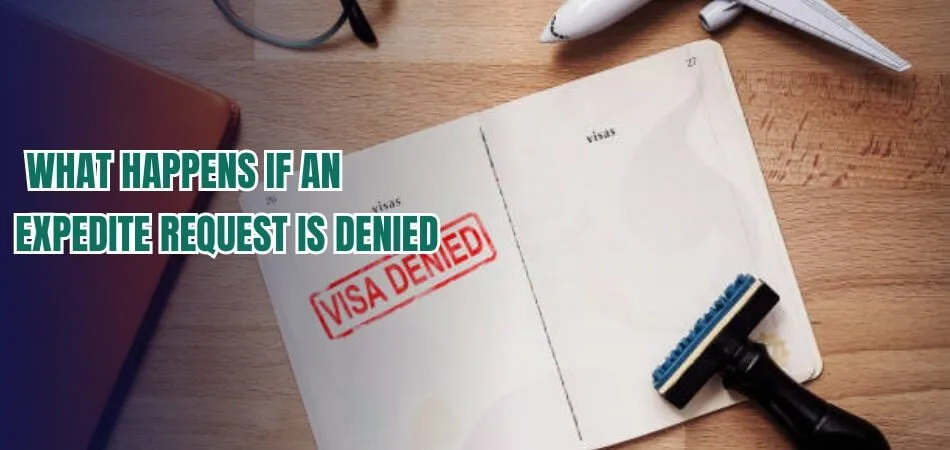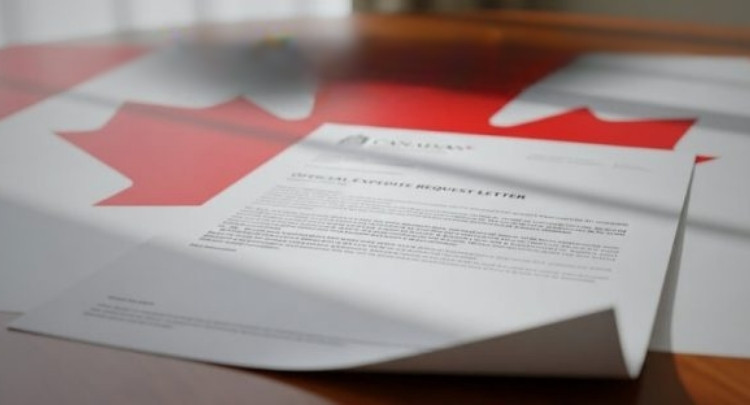An expedite request is used when someone needs faster processing for a pending visa, immigration, or government application. These requests are based on urgent needs. Many people submit them to avoid long wait times. Knowing the outcome helps reduce stress and plan your next steps effectively.
Understanding what happens if an expedite request is denied is important for peace of mind.
If an expedite request is denied, your main application is not refused. It simply returns to standard processing, keeping its original place in the queue. Authorities like USCIS treat expedite decisions as procedural, meaning denial does not negatively affect final approval.
Learn what to do after your expedite request is denied and how to stay on track. Discover common reasons for denial and what they really mean. Keep reading to understand your options and maintain confidence in your application process.
What Happens if an Expedite Request is Denied?
When authorities deny an expedite request, applicants often feel worried and confused about their application future. Understanding what truly happens helps reduce stress, plan next steps calmly, and avoid common mistakes that could delay decisions or create unnecessary frustration during processing.

Your Application Continues Normally
A denial does not stop your application or cancel anything you already submitted earlier. Officers simply move your file back into the regular line, where it continues processing under standard timelines without penalties or negative notes affecting eligibility review.
Your Place in the Queue Stays Safe
You do not lose your filing date, priority position, or previously completed steps after denial. The system keeps your place secure, meaning the application moves forward fairly alongside others, following the usual order set by the processing authority.
Denial Does Not Affect Final Approval
Officers judge speed requests separately from eligibility decisions, so denial does not change how they assess qualifications. Even if an expedited request fails, reviewers still evaluate documents, facts, and eligibility using the same legal standards as every other applicant.
You May Reapply With Better Reasons
Applicants may submit another request later if circumstances change or stronger proof becomes available. However, repeating requests without new facts often wastes time, so focus on clear evidence, real urgency, and well-organized documents before trying again.
Consider Other Practical Options
If urgency remains, explore priority services, paid fast processing, or adjusted travel and work plans. Some applicants choose to wait patiently, while others seek professional advice to decide whether alternative routes better fit their timeline and goals.
Comparison Table: What Happens After Expedite Denial by Authority
|
Authority |
Expedite Type | After Denial | Reapply? |
Typical Standard Processing |
|
USCIS |
Discretionary | Back to queue | Yes (new evidence) | Case-dependent |
| U.S. Embassy / Consulate | Emergency request | Normal scheduling | Limited |
Post-specific |
|
IRCC |
Priority consideration | Standard stream | Rare | Category-based |
| UKVI | Priority service | Standard service | Yes (paid) |
Weeks–months |
Does a Denied Expedite Request Affect Final Approval?
A denied expedite request does not affect the final decision of your application. Many people feel nervous after a denial, but it only changes the speed of processing, not the outcome. Officers treat speed requests and eligibility reviews as separate things. You can still get approved if your case meets the rules and all requirements.
Officers Review Each Case Fairly and Separately
Application decisions follow specific rules, no matter how fast someone wants a response from the agency involved. Officers follow legal steps when checking facts and forms to decide if someone qualifies. If an expedite request gets denied, they still use the same process while reviewing the rest of your file.
Denied Expedites Do Not Leave Negative Remarks
A rejected speed-up request does not create a bad mark or penalty on your immigration or visa history. The system does not flag your file as risky or wrong if it includes a failed urgency claim. Every new officer checks your paperwork cleanly, even if you once tried to move faster.
Strong Evidence Still Matters the Most
Final approval always depends on good proof, not the speed you request when sending your documents. You must show clear facts like job offers, family ties, or health needs that match the application type. An expedite request will not replace missing details or poor files when they judge your case.
Repeating Requests May Delay Progress
Some people try again quickly after their first expedite fails without fixing their reasons or adding new facts. Officers can ignore extra requests if they sound the same or seem careless. Too many repeat efforts sometimes slow things down or confuse timelines instead of helping the case move faster.
Every Agency Handles Expedites Differently
Rules for urgency requests vary by country, visa type, and reviewing office. Some offer paid faster processing, while others allow free expedite requests only in limited cases. Canada does not usually expedite visitor applications, but some high-skilled worker cases qualify for faster processing under the Global Skills Strategy. Always check official guides before reapplying.
Seek Legal or Expert Advice If Unsure
If you feel stuck or afraid about the process, talk to someone with real experience handling these requests. Trusted lawyers, counselors, or nonprofit helpers often know what to do next and when to wait. They can help improve your application and tell you if another request may work better.
Common Reasons Expedite Requests are Denied
People often feel confused when officials reject a request for faster processing. Many assume something went wrong, but the rules guide every decision carefully. Understanding the reasons helps you prepare better next time. Knowing these points early can save time, stress, and disappointment later.
Not Meeting Criteria
Immigration offices approve faster processing only for very limited and serious reasons. These include severe financial harm, which usually means a risk of business closure, layoffs, contract loss, or damage that cannot be fixed later. Other criteria include real emergencies or government-related needs. Wanting to start work sooner or travel earlier does not qualify, even if it feels urgent personally.
Weak Proof
A strong request always needs solid documents, not just personal explanations or feelings. Officers expect clear proof like medical letters, job loss notices, or official statements. If papers look unclear, incomplete, or unofficial, the request often fails. Words alone cannot show urgency, so missing proof remains one of the most common reasons for denial.
Self-Created Delays
Sometimes urgency happens because someone waited too long to apply or missed earlier steps. Officers do not approve faster processing when delays come from late filing, ignored emails, or missed appointments. If the problem could have been avoided, the request usually fails. Planning ahead matters more than rushing later when time already runs short.
Non-Urgent Needs
Many people request faster processing for normal plans like travel, school, or routine job needs. These reasons feel important but do not meet urgency rules. For example, attending events, visiting family, or joining meetings does not count. Even an invitation from a reputable conference organizer does not prove emergency unless serious harm connects directly to timing.
Pending Requirements
Some applications cannot move faster because other steps remain unfinished. Background checks, interviews, medical exams, or dependent cases must finish first. Officers cannot skip these parts, even with strong reasons. If any required step stays incomplete, the expedite request usually gets denied until everything clears properly.
Repeated Requests
Sending many requests for the same case often creates more problems than solutions. Officers may see repeated messages as unnecessary pressure. Instead of helping, this can slow responses or lead to quick denials. It is better to wait, improve evidence, and try once with stronger reasons rather than asking again without changes.
Premium Options
Some application types already offer paid faster processing services. When these options exist, officers rarely approve free speed-up requests. They expect applicants to use the official faster service instead. Only special nonprofit or public interest cases may receive exceptions, while others must follow the standard paid route.
How Does The Expedite Request Denial Affect Your Visa Processing?
When faster processing gets refused, many applicants worry about delays or hidden problems. In reality, the process stays simple and predictable. Understanding how denial affects visa processing helps you stay calm, follow timelines, and focus on required steps instead of unnecessary stress.
No Added Delay
The denial does not slow your application or push it backward in the processing line. Officers continue reviewing your file under normal timelines using the same rules. Your wait time stays standard, and the decision depends on documents, facts, and eligibility, not urgency requests.
Normal Case Tracking
After denial, you must still watch updates and respond to notices on time. When a USCIS expedite request gets refused, the online portal remains your main tool for updates. You should attend biometrics, interviews, and submit evidence quickly to avoid avoidable delays.
No Appeal Option
You cannot appeal a denial because officers decide these requests using discretion and limited criteria. They review urgency separately from benefits, so they close the request quickly. Your main application continues forward, even though the faster review option no longer applies.
Other Speed Choices
Some applications qualify for paid faster processing that gives clear timelines and reliable outcomes. If allowed, premium processing offers quicker reviews than standard queues. Otherwise, you may submit another request later only if new facts or stronger proof appear.
What to Do After Your Expedite Request Is Denied (Step-by-Step)
A denied expedite request can feel frustrating, but it does not stop your application progress. Clear steps help you stay organized, avoid mistakes, and respond wisely. Following a calm plan allows you to manage time, documents, and expectations without creating new delays.
Step 1: Review Denial Notice
- Read the notice carefully to understand possible reasons, such as missing proof or unmet urgency criteria.
- Look for short hints explaining whether evidence, timing, or eligibility issues caused the request refusal.
- Keep a copy saved safely because it helps guide future actions and prevents repeated mistakes.
Step 2: Check Case Status
- Log into your online account to track updates and confirm your application remains active.
- Review posted processing times for your form and service center to set realistic waiting expectations.
- Note the inquiry date shown online in case your file goes beyond normal processing limits.
Step 3: Complete Pending Tasks
- Attend biometrics appointments, interviews, or exams quickly to avoid extra waiting time.
- Respond to requests for evidence with clear documents before deadlines listed in notices.
- Finish every required step early so your case does not pause due to avoidable delays.
Step 4: Organize Documents
- Collect all receipts, notices, and letters related to your application in one secure place.
- Label files clearly so you can find evidence fast when officers ask questions.
- Keep digital backups because lost papers often cause confusion and slow responses later.
Step 5: Gather New Evidence
- Watch for changes like health problems or job risks that create real urgency later.
- Ask doctors, employers, or officials for letters that explain time-sensitive situations clearly.
- Strong proof matters more than personal explanations when asking for faster processing again.
Step 6: Reapply Carefully
- Submit another request only if your situation truly changed since the earlier denial.
- Avoid sending many requests because repeated messages can slow overall processing speed.
- Prepare a clear explanation showing why new facts now meet official urgency rules.
Step 7: Consider Paid Options
- Check whether your form allows premium processing with guaranteed response timelines.
- Paid services often move faster than normal queues when eligibility rules allow them.
- Compare costs carefully and decide if faster results justify the extra fee.
Step 8: Seek Congressional Help
- Contact a local senator or representative when delays pass normal processing times.
- Explain hardship clearly and share receipt numbers so staff can submit an inquiry.
- Understand that inquiries request updates only and do not guarantee faster approvals.
Step 9: Get Professional Advice
- Speak with a trusted immigration lawyer or accredited advisor for case-specific guidance.
- Professionals can review documents and suggest safer alternatives or better timing.
- Early advice often prevents costly mistakes and improves long-term outcomes.
Can You Reapply for an Expedite Request?
Yes, you can reapply for an expedite request when real changes create stronger urgency later suddenly arise. A denial only affects speed, not approval, so officers still review your case fairly under normal rules. You should reapply only after new facts appear, not by repeating old reasons again without proof changes. Clear planning helps you avoid wasted time and keeps expectations realistic during waiting periods for long cases.
Before reapplying, gather stronger proof like medical letters or employer notices showing urgent deadlines clearly today now. Officials expect honesty and clarity, so weak requests without changes often fail quickly during review stages anyway. Multiple rushed attempts can slow progress and confuse records, which hurts your overall timeline badly sometimes later. A careful new request works best when life events truly change your situation suddenly significantly enough legally.
Alternatives to Expedite Requests
While USCIS expedite requests are a common way to seek faster processing for applications, petitions, or appeals, they are discretionary and often denied if criteria aren’t met. If your expedite request isn’t an option or has been denied, here are key alternatives to potentially speed up your case. These focus on proactive steps, premium services, and external assistance. Always check your specific form’s eligibility and current USCIS guidelines, as policies can evolve—processing backlogs remain significant into 2026:
Opt for Premium Processing (If Eligible)
Premium processing guarantees a USCIS response (approval, denial, RFE, or notice of intent to deny) within a set timeframe, typically 15-45 calendar days depending on the form type, in exchange for a fee. This is available for specific forms, including:
- Form I-129 (Petition for a Nonimmigrant Worker) for categories like E-1/E-2, H-1B, L-1, O-1, P, Q, R, TN.
- Form I-140 (Immigrant Petition for Alien Workers) for most employment-based classifications.
- Form I-539 (Application to Extend/Change Nonimmigrant Status) for certain classifications.
- Form I-765 (Application for Employment Authorization) for specific categories. USCIS is expanding premium processing to additional forms over time. Note: Fees are increasing effective March 1, 2026—e.g., most I-129 and I-140 petitions will cost $2,965, while I-539 and I-765 will be $1,965. Submit Form I-907 with the fee; if your form isn’t eligible, this isn’t an option, and expedite requests are generally not considered for premium-eligible cases.
Submit a Congressional Inquiry
Contact your U.S. senator or representative’s office to request assistance with your case. They can submit an inquiry to USCIS on your behalf, which may prompt a status update or review, especially if your case is delayed beyond normal processing times or involves hardship. This doesn’t guarantee faster adjudication, but can highlight issues.
- Visit house.gov or senate.gov to find your representatives, fill out their privacy release form (often online), and provide your case details like receipt number and A-number.
- Experiences vary; some report it helps speed things up, while others see only status confirmations. Use this if your case is stuck or outside posted times.
Seek Help From the CIS Ombudsman
The DHS Office of the Citizenship and Immigration Services Ombudsman provides independent assistance for resolving problems with USCIS, such as delays or procedural issues. This is useful for systemic issues or when other channels fail.
- Process: Submit a case assistance request online at dhs.gov/case-assistance or call 1-800-375-5283. Include details and evidence of hardship.
- It’s not a direct speedup, but it can lead to USCIS reviewing your case.
File a Writ of Mandamus
A Writ of Mandamus is a legal option used when an application has been delayed for an unusually long time and other options have not worked. It asks a federal court to require the agency to make a decision on a pending case.
- Used only after normal processing, expedite requests, congressional inquiries, and Ombudsman assistance
- Does not request approval, only a decision
- Common in long-delayed business or employment cases
- Involves legal costs and court procedures, so professional advice is usually needed
File Error-Free and Respond Promptly to USCIS Requests
Prevent delays by ensuring your initial application is complete and accurate, avoiding common pitfalls like missing documents or forms. Always respond to Requests for Evidence (RFEs) or Notices of Intent within the deadline (usually 87 days for RFEs). Complete required steps like biometrics or interviews on time—these can bottleneck processing.
Monitor and Inquire Through USCIS Channels
Regularly check your case status via the USCIS online account or uscis.gov/casestatus. If your case exceeds posted processing times (check uscis.gov/processingtimes), submit an e-Request inquiry for “case outside normal processing time.” This can prompt a review without needing an expedite.
Consider Emergency or Special Relief Options
For urgent situations like emergency travel, request advance parole via Form I-131 with evidence of the emergency. In disasters or unforeseen circumstances, USCIS may offer special immigration relief, such as fee waivers or extensions—check uscis.gov for announcements.
Consult an Immigration Attorney or Accredited Representative
A professional can review your case for overlooked options, ensure compliance, and advocate on your behalf. They may identify eligibility for premium processing or help craft stronger follow-ups.
FAQs About Expedite Request Denial
When an expedite request gets denied, many smaller questions still remain unanswered. People worry about timelines, records, travel plans, and next steps that are not always explained clearly. These frequently asked questions address common doubts and help applicants understand how denial affects different parts of their case.
Will I Get Any Fee Refund After an Expedite Request Is Denied?
No refund applies because USCIS does not charge a separate fee for reviewing expedite requests. If you paid a filing fee for the main application, that fee still covers standard processing only. The denial simply ends the faster review request and does not change paid amounts.
Does a Denied Expedite Show on My Immigration Record?
USCIS keeps an internal note showing that a request was reviewed and closed. This record does not count as a negative mark or violation. Officers reviewing your case later focus on eligibility, documents, and facts, not whether you once asked for faster processing.
Will My Employer Be Notified About the Denial?
USCIS does not notify employers directly unless they are the official petitioner or contact person. Employers usually learn about denial only if you choose to share updates. The denial does not trigger employer penalties or reports, and work authorization rules remain unchanged.
Can a Denied Expedite Affect Dependent Applications?
A denied expedite request does not change how dependent applications process. Spouses or children linked to your case remain in the same queue as before. Their eligibility and timelines follow the original filing and do not reset or suffer penalties.
What Does “Case Was Not Expedited” Mean in Online Status?
This status means USCIS reviewed the request and chose not to prioritize the case. It does not signal refusal, investigation, or problem. The system simply confirms that the file returned to normal processing under standard timelines.
Should I Contact USCIS Again After the Denial?
You should contact USCIS only if your case passes normal processing times or you receive new notices. Reaching out repeatedly without changes rarely helps. Use official tools, track deadlines, and wait unless something important changes in your situation.
Can I Travel Outside the Country After an Expedite Denial?
Travel rules depend on your visa type and current status, not the expedite decision. A denial does not grant or remove travel permission. Always confirm travel eligibility first, because leaving without proper approval can affect your application.
Does a Denied Expedite Delay Biometrics or Interviews?
The denial does not delay scheduled appointments. Biometrics, interviews, or exams continue as planned unless USCIS reschedules them. Missing appointments can cause delays, so attend every required step even after the expedite request fails.
Can I Withdraw My Application After an Expedite Denial?
You may withdraw your application at any time, but denial alone is not a reason to do so. Withdrawal does not guarantee refunds or faster future processing. Most applicants benefit more from continuing under standard timelines instead.
Will Processing Speed Improve Automatically Later?
Processing speed may improve naturally if backlogs reduce or staffing changes occur. This improvement happens independently of expedite requests. Staying compliant, organized, and responsive gives your case the best chance to move forward smoothly.
Final Verdicts
An expedite denial can feel discouraging, but it rarely changes the real direction of your application. The decision only affects timing, not fairness, eligibility, or final approval chances. Many applicants worry about hidden consequences, yet the process continues normally under standard rules.
Understanding what happens if an expedite request is denied helps you respond calmly instead of reacting with stress or repeated requests. Staying organized, meeting deadlines, and tracking updates matter far more than speed requests alone. When circumstances truly change, stronger evidence can open new options. Until then, patience, clarity, and steady follow-up remain the smartest path forward.








